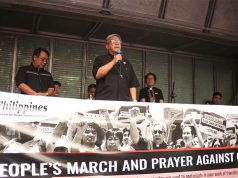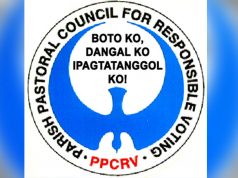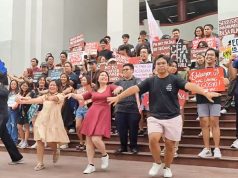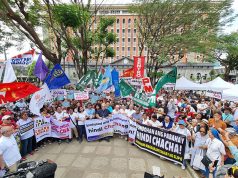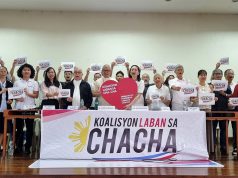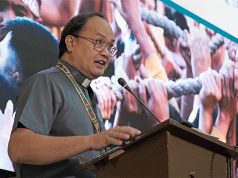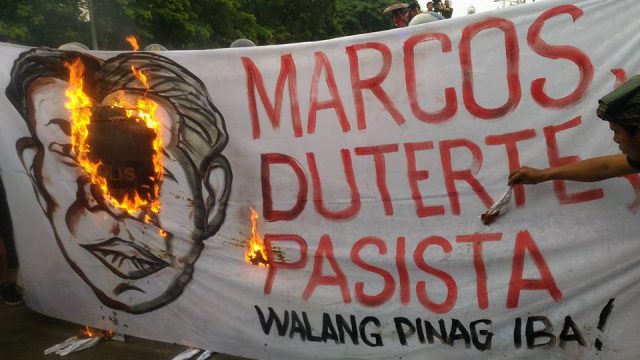
MANILA, Philippines – (UPDATE2, 3:53 p.m) Same political dynasties, same oligarchs, longer term and centralized power for President Rodrigo Duterte.
All roads lead to this scenario with the proposed constituent assembly and the possibility of a postponed elections as the country prepares the shift to federalism, opposition lawmakers said.
And, if Congress agrees, then it will just become a “virtual rubber stamp” of President Rodrigo Duterte, who will be the main beneficiary of all these changes, they said.
Speaker Pantaleon Alvarez, however, was quick to dismiss speculations of term extension for the President and accused the opposition of sowing confusion over the no-el scenario.
He said Duterte has categorically stated he would not stay in his post for a minute longer after his term expires.
“Malinaw po ang sinabi ng Pangulo na yung kanyang termino mag-e-end on or before (2022.) Kasi kung kinakailangan niyang mag-resign bago mag-2022 para ang ating bagong Saligang Batas, yung bagong sistema ng gobyerno ay kaya niyang gawin yon [The President clearly said his term ends in 2022. Because if he needs to resign before 2022 to pave the way for the new Constitution and the transition to a new form of government, then he can do it],” Alvarez said in a radio interview.
“Matagal ko nang kilala yan, talagang pagod na rin at kung pupuwede nga lang bukas…[I’ve known him for a long time. I know that he’s tired and if he could only resign tomorrow, he’d do so],” he added.
ROQUE: DUTERTE SHUNS TERM EXTENSION
Presidential Spokesperson Harry Roque echoed Alvarez’s view that Duterte is not interested in having a term extension.
“The President is the chief implementor of the Constitution and the laws of the land. unless and until the constitution is amended and ratified by the people, elections will push through in 2019, and what the President promises is that if elections push through, we will have a credible and honest election,” Roque said in a press conference in Davao City on Thursday.
“On the possible term extension, he has said it before: if we can amend the Constitution, and provide for provisions that would minimize graft and corruption, he will even resign prior to the end of his term of office in 2022. So the President is considering shortening his term but has definitely rejected even the idea of prolonging his term,” said Roque
“The President has no wish to extend his term. If the Constitution can be amended to provide for federalism, and to provide for provisions that would strengthen public accountability, he said he is willing to cut short his term. So the idea of prolonging his term is out of the question,” added Roque.
Then, echoing Alvarez anew, the Palace official said: “Walang pagnanais si Presidente na pahabain pa ang kanyang termino. Gusto nga niyang paikliin pa kung pupwede [The President has no desire to extend his term. He’d want it shortened, in fact, if such is possible].”
COMELEC: READY TO FULFILL MANDATE TO HOLD ELECTIONS
The Commission on Elections, meanwhile, urged people to participate “in the national conversation on constitutional amendment,” while giving assurances it was ready to hold elections as mandated.
Comelec said Speaker Alvarez’s float of a “No-election” scenario in 2019 was just one of “several possible outcomes” if and when the shift to federalism happens, but Comelec was confident people would retain their right to regularly pick their leaders.
In a statement, Comelec spokesman Atty. James Jimenez said, the poll body “remains committed to fulfilling its mandate of conducting free and fair elections in accordance with the provisions of the 1987 Constitution.”
It would appear, he added, that Alvarez was “merely describing one of several possible outcomes that would arise from a successful shift to a federal form of government. The COMELEC however, remains confident that such a shift – should it happen – can be accomplished without depriving the sovereign Filipino people of their Constitutionally guaranteed right to select their own leaders through free and fair elections.”
Finally, Comelec urged everyone “to participate in the national conversation on Constitutional amendment, particularly in the matter of federalism, so that should the time come to choose, the votes we cast shall be fully informed and well-considered.”
‘ROAD TO CENTRALIZED POWER’
In a statement, Bayan Muna chairperson and former congressman Neri Colmenares said the road is being paved for a centralized power for Duterte – “whether it’s martial law, revolutionary government or charter change.”
“Worse, these roads may get the support of many politicians as a result of the cancellation of the 2019 elections and the wholesale extension of terms of all government officials from the senators down to councilors,” Colmenares said.
Caloocan Representative Edgar Erice said the proposed move to convene the House and the Senate into a constituent assembly to revise the 1987 Constitution will “retard the democratic institutions” and “promote self-serving interests of those who want their asses perpetually in their seats.”
“The same oligarchs, the same dynasties under auspices of the Duterte administration. God bless the Philippines,” Erice said.
Albay Rep. Edcel Lagman said that with the supermajority lawmakers dominating the House, Congress, as a constituent assembly, will become a “virtual rubber stamp” of Duterte.
“With the projected constituent assembly principally composed of Duterte’s dyed-in-the-wool allies, what the President wants as amendments or revision will be delivered with alacrity and minimal debate,” he said.
“This imprudent fast tracking happened in the two extensions of martial law in Mindanao and the approval of the reimposition of the death penalty by the House of Representatives,” he added.
Lagman said that amending the charter should undergo “serious and deliberate consideration” since it would affect the present and future generations.
Instead, he said a constitutional convention must be called where the delegates are elected by the sovereign people to singularly and precisely propose amendments to or revision of the 1987 Constitution.
“We must not count centavos and pesos in undertaking a charter change by asserting that a constituent assembly is less expensive than holding a constitutional convention. It is not a question of expense but a matter of independence and integrity,” Lagman added.
Magdalo party-list Rep. Gary Alejano said the people should watch out for the transitory provision of the planned federal constitution.
“Duterte would now be able to achieve absolute power, which he hoped for in a revolutionary government, legally,” he said.
Alejano noted that the Charter change version being deliberated at the House contains a transitory provision which dissolves Congress and bestows legislative powers to the president until such time that the federal assembly is constituted.
“The transition period, however, could last for years as what Marcos did in the 1973 Constitution’s transitory provision. We would see a repeat of Marcos as we are seeing many similarities already. Duterte is certainly reading Marcos’ playbook,” Alejano said.
Colmenares warned that if the mode for amending the Constitution is the constituent assembly, then “it’s a foregone conclusion that President Duterte’s super majority in Congress can craft the new Constitution according to their will.”
With the proposed transitory provision that would allow Duterte to exercise legislative powers, Colmenares said the chief executive can issue presidential decrees and pass laws beyond 2019.
“Strangely, the proposed PDP Laban Federal Constitution does not contain transitory provisions which means that they could put in anything including no-el and term extensions once Congress convenes as a constituent assembly. Chacha, including con ass, is a threat to the most fundamental freedoms of the Filipino people,” Colmenares said. – With reports by JV Arcena, News5 and Tricia Aquino, InterAksyon




